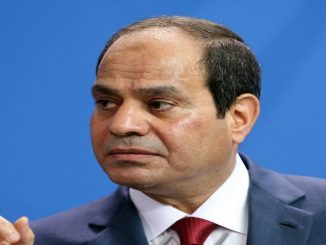
Head of U.S. Central Command General Kenneth McKenzie has announced that the $130 million in military aid that the US administration has recently decided to reprogram away from Egypt is very small.
General Kenneth F. McKenzie Jr., the head of U.S. Central Command, on February 9 began a trip to Cairo, where he told reporters that the $130 million in military aid that the administration recently decided to reprogram away from Egypt is “a very small amount.”
McKenzie said that the reprogrammed aid is “intended to be a signal” and added, “We still have a very robust weapons program with Egypt and we’re still very heavily engaged with them.”
Regarding human rights concerns, McKenzie also told Reuters: “At the (military) level, we need to be honest with each other about factors that can influence the relationship. Clearly that’s a factor that can influence the relationship.”
Unlike during his trip to Cairo one year ago, McKenzie appears not to have met with Egypt’s Abdel Fattah al-Sisi during this latest visit.
Also on February 9, the U.S. Commission on International Religious Freedom (USCIRF) again called for the release of Reda Abdel Rahman, who it noted “is being held simply for being a member of Egypt’s Qur’anist community and peacefully expressing his religious beliefs.”
Abdel Rahman, a cousin of the Committee Protect Journalists’ Sherif Mansour, was arrested alongside several family members in August 2020. His relatives were soon released, but Abdel Rahman was forcibly disappeared for 40 days before prosecutors charged him with joining ISIS and promoting religious extremism.
Abdel Rahman is a prominent proponent of Quranism, a movement which views the Quran as the only legitimate source of authority for Islamic law. The community has long faced persecution from Egyptian authorities, who regard Quranism as heretical.
USCIRF Commissioner Sharon Kleinbaum stated, “Not only has he been unjustly detained on unsubstantiated terrorism allegations, but prison authorities have also mistreated Abdel Rahman, denying him vitally necessary medical care. . . . Authorities should stop harassing the Qur’anist community and immediately release Abdel Rahman so he can receive proper medical care.”
On February 10, Democracy for the Arab World Now (DAWN), Freedom Forward, and the Quincy Institute said Brownstein Hyatt Farber Schreck lobbyist and former House Committee on Foreign Affairs Chair Ed Royce is “contributing to, and benefiting from, human rights violations by using his high-level access to ensure continued U.S. support for [Egypt and other] systematically abusive governments.”
After 14 terms in Congress, Royce retired in 2019 and joined Brownstein the next year, where he lobbies for the Egyptian and Saudi Ministries of Foreign Affairs. DAWN says that Royce “wielded his political influence to schedule briefings and calls for the Egyptian Ministry and for the Egyptian Ambassador to the United States Motaz Zahran to meet with members of Congress and their staffs.”
The organizations note that these meetings came as Egypt was lobbying the Biden administration to release $300 million of military aid which Congress had conditioned on human rights conditions. Despite Egypt’s failure to meet the conditions, the administration ultimately withheld only $130 million of it and provided Egypt with the remaining $170 million.
While chair of the House Foreign Affairs Committee, Royce argued that “America is more secure when fewer nations are authoritarian” and that “human rights are far better protected in democratic countries, ones without dank prison cells full of political prisoners.” Today, he is helping to ensure the flow of U.S. military aid to one of the world’s most authoritarian governments, one which holds tens of thousands of political prisoners in its dank prison cells.



